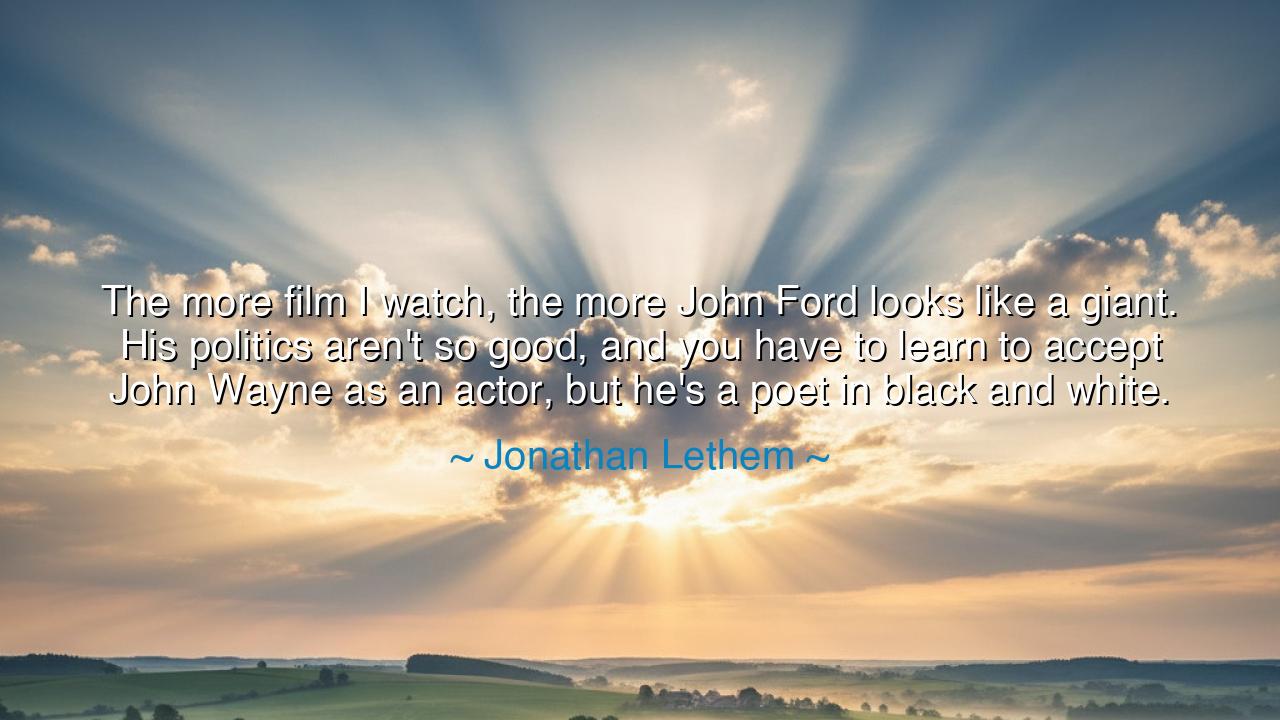
The more film I watch, the more John Ford looks like a giant.
The more film I watch, the more John Ford looks like a giant. His politics aren't so good, and you have to learn to accept John Wayne as an actor, but he's a poet in black and white.






Art is a realm where greatness often mingles with imperfection. When Jonathan Lethem declared, “The more film I watch, the more John Ford looks like a giant. His politics aren't so good, and you have to learn to accept John Wayne as an actor, but he's a poet in black and white,” he spoke of the complex balance between vision and flaw, between the message of an artist and the enduring power of their craft. His words remind us that true artistry transcends ideology, for while a creator’s politics or beliefs may be flawed, their work can still reveal a poetic truth that speaks to generations.
At the heart of Lethem’s reflection is the idea that greatness must be seen in layers. John Ford, one of cinema’s most legendary directors, shaped the visual language of film through his mastery of composition, storytelling, and the stark beauty of black-and-white cinematography. Though his political views and the archetypes he celebrated—such as the rugged masculinity embodied by John Wayne—may not align with modern sensibilities, his films remain towering achievements. They are monuments of imagery and emotion, capturing the mythic spirit of the American frontier and the universal struggles of humanity.
This tension between the flawed individual and the transcendent work is not unique to Ford. History is filled with creators whose personal beliefs did not always reflect the ideals we cherish today. Consider Richard Wagner, whose operas reshaped the very foundations of music, even as his political and social views stirred controversy and division. To dismiss his work entirely because of his personal failings would be to deny the transformative power of his art. Likewise, Lethem urges us to see beyond politics, to witness Ford’s films as poetic visions, even when we must grapple with their imperfections.
The phrase “a poet in black and white” is a tribute to Ford’s visual genius. His films, particularly his early Westerns, used the simplicity of black-and-white imagery to evoke timeless themes—loneliness, courage, sacrifice, and the vast, unforgiving beauty of the natural world. Through light and shadow, he crafted cinematic poetry that spoke not only of America’s past but also of the human condition itself. Just as ancient poets like Homer wove myths to explain the world, Ford’s frames became modern myths, etched in silver light.
Lethem’s mention of John Wayne reflects another layer of artistic reconciliation. Wayne, often criticized for limited range, nevertheless became a symbol within Ford’s storytelling—a living embodiment of the ideals and conflicts Ford sought to explore. Accepting Wayne as an actor means understanding him not as an isolated performer but as a vital piece of Ford’s cinematic language. It is a reminder that sometimes, the symbol transcends the individual, and meaning arises from the collaboration of vision and performance.
Let this teaching endure: when we gaze upon art, we must see it whole, with both reverence and discernment. As Lethem’s words reveal, greatness is seldom pure. The artist may stumble, their politics may falter, but their work can still reach toward the eternal. In Ford’s black-and-white visions, we are invited to look beyond the surface, to find poetry amidst imperfection, and to honor the truth that endures even when the hands that shaped it were flawed.






PEPladimir Extras
This quote makes me reflect on the idea of legacy and how artists evolve over time. It seems like Lethem is saying that, despite their flaws, both Ford and Wayne have made an indelible mark on film history. But it also brings up the question of how we deal with the contradictions in our idols. Should we accept their flaws because their work is brilliant, or should we hold them to higher standards?
TKDoan Vo Tan Kiet
I like how Lethem sees John Wayne as a ‘poet in black and white,’ which makes me reconsider my view of him as just a tough-guy actor. The way the quote describes Ford’s films, I feel like it suggests that there’s more depth to them than just their surface-level themes. But it also makes me think: if Ford’s politics are questionable, should it affect how we view his work, even if it’s artistically brilliant?
TNVan tue Nguyen
This quote really speaks to the idea of separating art from the artist. John Ford’s films may have political views that don't align with mine, but the way Lethem frames his artistry as ‘poetic’ makes me think about how impactful storytelling can transcend personal politics. I guess it raises the question: is it possible to celebrate someone’s work without endorsing everything they stand for? How do we separate the two effectively?
THYen Truong Hai
I love how this quote highlights the complexity of John Ford and John Wayne as artists. It's interesting how Lethem acknowledges their flaws, but still recognizes their unique contributions to cinema. It makes me wonder if we often let personal or political disagreements overshadow the artistic value of someone’s work. Can we appreciate art while separating the artist's views from the art itself? How do we navigate this tension in other forms of media?